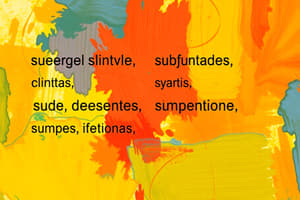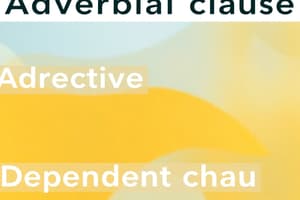Podcast
Questions and Answers
What does the use of 'when' indicate in sentences?
What does the use of 'when' indicate in sentences?
- It primarily indicates reasons for actions.
- It indicates time or conditions. (correct)
- It serves solely as a noun modifier.
- It functions as an adjective in the sentence.
In complex sentences with multiple 'when' clauses, what is most critical for effective communication?
In complex sentences with multiple 'when' clauses, what is most critical for effective communication?
- Using more 'when' clauses for emphasis.
- Employing the passive voice to shift focus.
- Clarity and avoiding ambiguity. (correct)
- Avoiding any conjunctions entirely.
What is an example of an idiomatic expression that uses 'when'?
What is an example of an idiomatic expression that uses 'when'?
- When it rains, it pours.
- When all is said and done. (correct)
- When in Rome, do as the Romans do.
- When the sun rises in the west.
Which of the following is true about the position of 'when' clauses in sentences?
Which of the following is true about the position of 'when' clauses in sentences?
How do 'when' clauses differ from other conjunctions like 'while' and 'if'?
How do 'when' clauses differ from other conjunctions like 'while' and 'if'?
What type of clause does 'When the rain stopped, we went outside to play' represent?
What type of clause does 'When the rain stopped, we went outside to play' represent?
In which scenario does 'when' indicate a condition rather than a specific time?
In which scenario does 'when' indicate a condition rather than a specific time?
How does 'while' differ from 'when' in usage?
How does 'while' differ from 'when' in usage?
Which of the following is an example of 'when' indicating repeated actions?
Which of the following is an example of 'when' indicating repeated actions?
Which sentence utilizes 'when' to refer to a general time rather than a precise time?
Which sentence utilizes 'when' to refer to a general time rather than a precise time?
How does a 'when' clause differ from a noun clause?
How does a 'when' clause differ from a noun clause?
In the sentence 'If it rains, we won't go', which conjunction indicates certainty?
In the sentence 'If it rains, we won't go', which conjunction indicates certainty?
Which of the following is NOT a use of 'when' clauses?
Which of the following is NOT a use of 'when' clauses?
Flashcards
When Clause Function
When Clause Function
"When" clauses modify the main verb or other elements in a sentence, indicating time or conditions.
When Clause Position
When Clause Position
"When" clauses can appear at the beginning, middle, or end of a sentence.
When Clause Meaning
When Clause Meaning
"When" can indicate precise time, general time, or repeated events.
'When' vs. 'While'
'When' vs. 'While'
Signup and view all the flashcards
'When' Idioms
'When' Idioms
Signup and view all the flashcards
What are 'when' clauses used for?
What are 'when' clauses used for?
Signup and view all the flashcards
What are temporal 'when' clauses?
What are temporal 'when' clauses?
Signup and view all the flashcards
What are conditional 'when' clauses?
What are conditional 'when' clauses?
Signup and view all the flashcards
How is 'when' different from 'while'?
How is 'when' different from 'while'?
Signup and view all the flashcards
How is 'when' different from 'if'?
How is 'when' different from 'if'?
Signup and view all the flashcards
Where can you place 'when' clauses in a sentence?
Where can you place 'when' clauses in a sentence?
Signup and view all the flashcards
What variations of time can 'when' clauses describe?
What variations of time can 'when' clauses describe?
Signup and view all the flashcards
How are 'when' clauses different from noun clauses?
How are 'when' clauses different from noun clauses?
Signup and view all the flashcards
Study Notes
Understanding Clauses with "When"
- Clauses introduced by "when" function as adverbial clauses, modifying the main verb or other elements in the sentence.
- These clauses express time, temporal relationships, or conditions.
Types of "When" Clauses
-
Temporal Clauses: These clauses indicate when an action or event happened, often describing the time of an event compared to another.
-
Example: When the rain stopped, we went outside to play. (The stopping of rain precedes the going outside)
-
Conditional Clauses: "When" can introduce clauses expressing conditions.
-
Example: When the weather is good, we go for walks. (Walking depends on good weather)
Distinguishing "When" from Other Conjunctions
-
"When" vs. "While": "When" implies a specific point in time, while "while" denotes a period of time.
-
Example: When the alarm clock rang, I woke up. (Specific moment) / While I was sleeping, the alarm clock rang. (Period of time)
-
"When" vs. "If": "When" implies certainty (past or future), "if" suggests conditionality.
-
Example: When the sun rises, the birds sing. (Certain occurrence) / If the sun rises, the birds sing. (Conditional)
Placement and Structure
- "When" clauses can be placed at the beginning or end of a sentence, sentence structure dictates the best placement.
- Example: (Beginning) When the phone rang, I answered it. / (End) I answered it when the phone rang.
Different Meanings of "When"
-
Precise Time: "When" describes a specific moment in time.
-
Example: When the clock struck twelve, the party began.
-
General Time: "When" indicates a general time or period related to another action.
-
Example: When I was a child, I loved to play in the garden.
-
Repeated Actions: "When" signals that an action happens repeatedly in a certain instance or context.
-
Example: When we went to the beach, we always played volleyball.
Distinguishing "When" Clauses from Noun Clauses
- "When" clauses never function as direct objects of verbs, unlike noun clauses.
- Example: Noun Clause: He didn't know when the work would begin. / When clause: When the work began, he started his own. (First is a noun clause, second is an adverbial clause)
Common Misunderstandings
- "When" as a linking word: The use of "when" is flexible, its function and meaning depend on the surrounding text.
Complex Sentences with Multiple Clauses
- Multiple "when" clauses in a sentence necessitate clarity to avoid ambiguity.
- Consider sentence structure for accurate meaning.
Idiomatic Use of "When"
- "When" can combine with other terms to form idiomatic expressions.
- Example: When all is said and done (When the process is complete)
Summary of Key Concepts
- "When" clauses modify parts of a sentence, primarily indicating time or conditions.
- Placement can vary.
- Meanings can be precise, general, or repeated.
- Distinguish "when" from "while," "if," and noun clauses.
- Context and idiomatic usage are crucial.
Studying That Suits You
Use AI to generate personalized quizzes and flashcards to suit your learning preferences.




